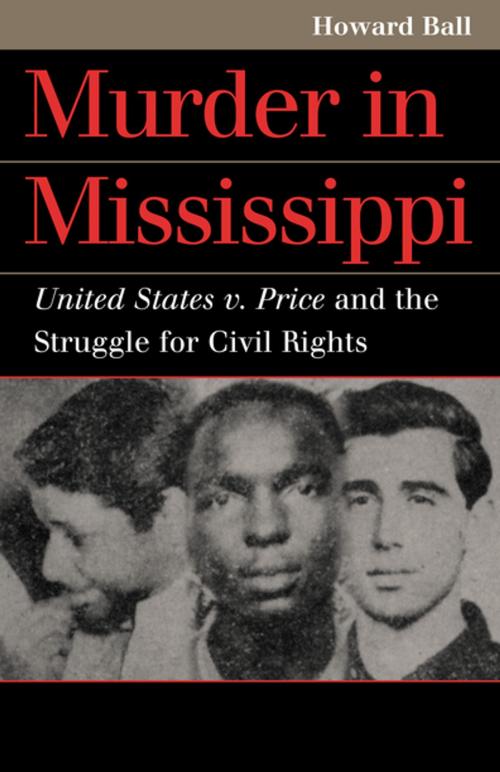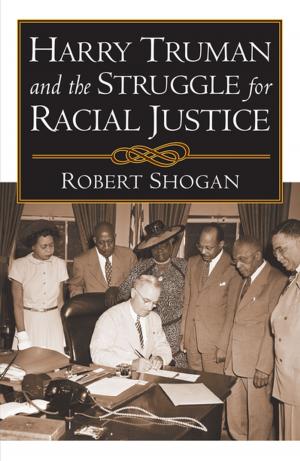Murder in Mississippi
United States v. Price and the Struggle for Civil Rights
Nonfiction, Reference & Language, Law, Civil Rights, Legal History, Constitutional| Author: | Howard Ball | ISBN: | 9780700624348 |
| Publisher: | University Press of Kansas | Publication: | April 16, 2004 |
| Imprint: | University Press of Kansas | Language: | English |
| Author: | Howard Ball |
| ISBN: | 9780700624348 |
| Publisher: | University Press of Kansas |
| Publication: | April 16, 2004 |
| Imprint: | University Press of Kansas |
| Language: | English |
Few episodes in the modern civil rights movement were more galvanizing or more memorialized than the brutal murders of Michael Schwerner, Andrew Goodman, and James Chaney—idealists eager to protect and promote the rights of black Americans, even in the deep and very dangerous South. In films like Mississippi Burning and popular folk songs, these young men have been venerated as martyrs. Even so, the landmark legal dimensions of their murder case have until now remained largely lost.
Howard Ball reminds us just how problematic the prosecution of the murderers—all members of the KKK—actually was. When the State of Mississippi failed to indict them, the U.S. tried to prosecute the case in federal district court. The judge there, however, ruled that the federal government had no jurisdiction and so dismissed the case. When the U.S. appealed, the Supreme Court unanimously overturned the lower court decision, claiming that federal authorities did indeed have the power to police civil rights violations in any state. United States v. Price (1967) thus produced a landmark decision that signaled a seismic shift in American legal history and race relations, for it meant that local authorities could no longer shield racist lawbreakers.
Ball weaves the tales of victims and perpetrators into a single compelling story in which the legal process becomes as much personal as political. Readers will learn how deputy sheriff Cecil Price and his accomplices planned the execution of the young freedom riders and how prosecutors and judges brought them to justice under conspiracy charges. Along the way, Ball introduces readers to a host of characters from the heyday of the civil rights era—with the NAACP, CORE, and SNCC on one side, and the KKK and its fellow travelers on the other, and politicians sitting squarely on the fence.
Although to this day the murderers have never faced murder charges, United States v. Price emphatically declared that the federal government would no longer tolerate the complicity of local and state authorities in the suppression of the constitutional rights of southern blacks. As we approach the fortieth anniversary of the murders in June 2004, Murder in Mississippi provides a timely and telling reminder of the vigilance democracy requires if its ideals are to be fully realized.
Few episodes in the modern civil rights movement were more galvanizing or more memorialized than the brutal murders of Michael Schwerner, Andrew Goodman, and James Chaney—idealists eager to protect and promote the rights of black Americans, even in the deep and very dangerous South. In films like Mississippi Burning and popular folk songs, these young men have been venerated as martyrs. Even so, the landmark legal dimensions of their murder case have until now remained largely lost.
Howard Ball reminds us just how problematic the prosecution of the murderers—all members of the KKK—actually was. When the State of Mississippi failed to indict them, the U.S. tried to prosecute the case in federal district court. The judge there, however, ruled that the federal government had no jurisdiction and so dismissed the case. When the U.S. appealed, the Supreme Court unanimously overturned the lower court decision, claiming that federal authorities did indeed have the power to police civil rights violations in any state. United States v. Price (1967) thus produced a landmark decision that signaled a seismic shift in American legal history and race relations, for it meant that local authorities could no longer shield racist lawbreakers.
Ball weaves the tales of victims and perpetrators into a single compelling story in which the legal process becomes as much personal as political. Readers will learn how deputy sheriff Cecil Price and his accomplices planned the execution of the young freedom riders and how prosecutors and judges brought them to justice under conspiracy charges. Along the way, Ball introduces readers to a host of characters from the heyday of the civil rights era—with the NAACP, CORE, and SNCC on one side, and the KKK and its fellow travelers on the other, and politicians sitting squarely on the fence.
Although to this day the murderers have never faced murder charges, United States v. Price emphatically declared that the federal government would no longer tolerate the complicity of local and state authorities in the suppression of the constitutional rights of southern blacks. As we approach the fortieth anniversary of the murders in June 2004, Murder in Mississippi provides a timely and telling reminder of the vigilance democracy requires if its ideals are to be fully realized.















